The Evi Voutsina Award: Sikoutris Loukoumia
Dina Sikourti is a guardian of tradition. She inherited her loukoumi business (loukoumi being the Greek word for Turkish delight) from her father, and today it is one of the oldest still in operation on the island of Syros.
Her delicate sweets are still made according to the traditional recipe. Sugar, starch, and aromatic essential oils are boiled (without the addition of glucose syrup) in copper pots. The resulting loukoumia are no different from those that once arrived in royal courts throughout Europe.
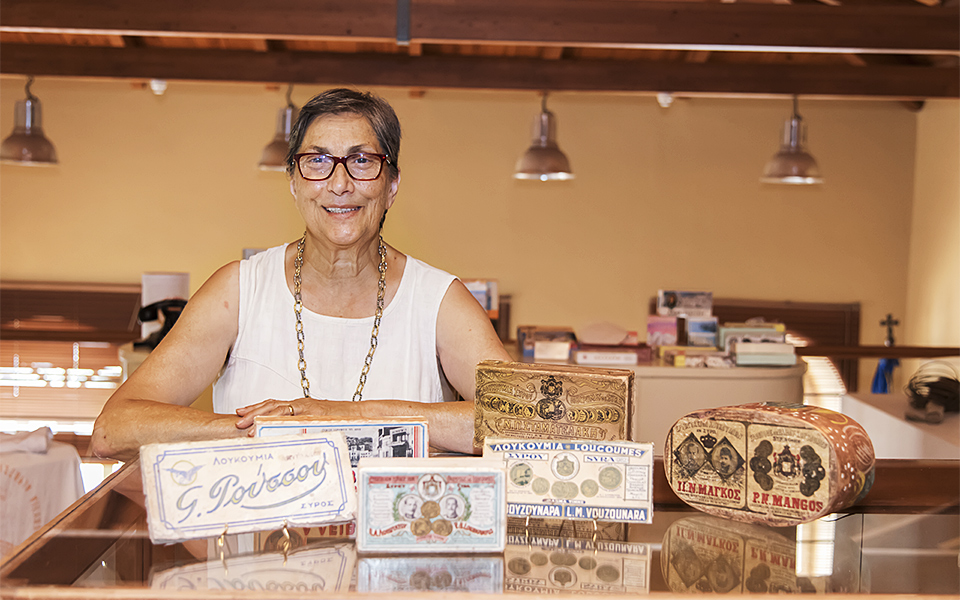
© Evelyn Foskolou
Sikourti saw Ermoupoulis, the capital of Syros, in its glory days when the town had as many as 35 pastry and sweet shops, but also witnessed the decline of the industry which forced most of them to close.
She then went from shop to shop to try and save what was being thrown out: everything from sweet boxes to tools to old photographs. She used these to create the exhibit dedicated to loukoumia that is now on display at the Industrial Museum of Ermoupoulis.
“The bedrock of Ermoupoulis is salt and sugar. Despite the fact that these dissolve in the sea, they are what supported Ermoupolis,” she says. A restless spirit, she is on a constant quest for knowledge and last year enrolled in the Open University of Patras in the department of humanities, specializing in Greek culutural studies. She is 73 years old.
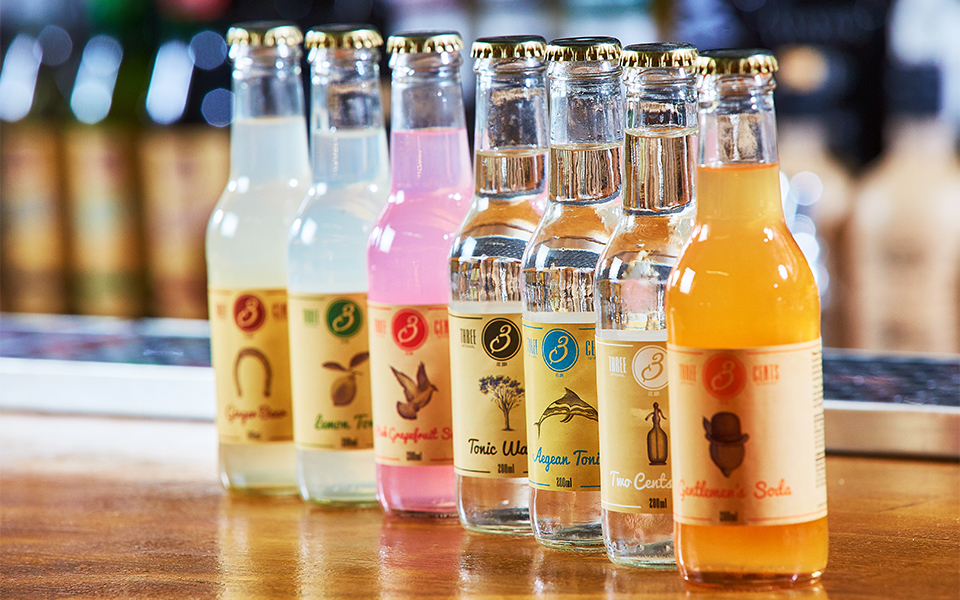
The Innovation Award: Three Cents
Three years ago, four friends and bartenders: George Bakos, Dimitris Dafopoulos, George Tsirikos, and Vassilis Kalantzis started the exceptional soft drink company, Three Cents. They began with limited funds, but with plenty of passion and even more fearlessness.
And their gamble paid off. Today they produce 5.5 million bottles per year, 60% of which are exported to 23 different countries in Europe, Asia, and America. Some of the best bars in the world now mix cocktails with their artisanal soft drinks.
Their pink grapefruit soda, their ginger beer, and their refined tonics are gaining ground over the products of global giants.
The secret behind the success of Three Cents’ is the quality and the exceptional taste of their drinks. They are 100% natural products, without preservatives, artificial flavorings or colorings, and have high levels of carbonation. They use the zest of Greek citrus fruits harvested at their peak, Greek basil and mint, and only moderate amounts of sugar – just as when they started making them themselves in their bars.
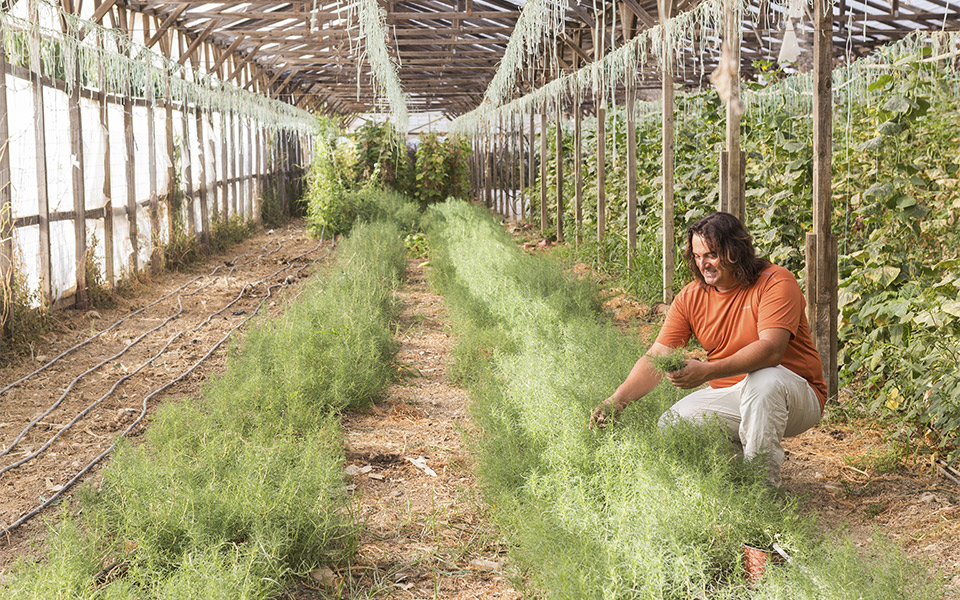
© Effie Paroutsa
Organic Farming Award – Kostas Kremmydas
With just a click of a mouse, fresh and delicious organic vegetables are brought straight to your door. How? Through Kostas Kremmydas’ e-shop. An agricultural technician, in 1996 he moved to Kissamos in Chania on Crete, rented some fields and launched his organic farming venture.
At the age of 36 he then studied for a postgraduate degree in organic agriculture in Scotland, where he got the idea to sell fresh vegetables online. Back in Greece, he started ‘Kremmydas Biokivotia‘ (meaning ‘organic crates’).
His products are fresh, tasty, and cultivated with care by Kremmydas and the farmers he collaborates with. A weekly newsletter informs customers which vegetables are ripe and ready, who grows them and where, and for how long they will be in season.
He’s even open about any road-bumps; such as when the fruit produced by a certain farmer drops in quality and he stops stocking it. In this way, consumers are encouraged to take an active interest in the journey of food from farm to table.
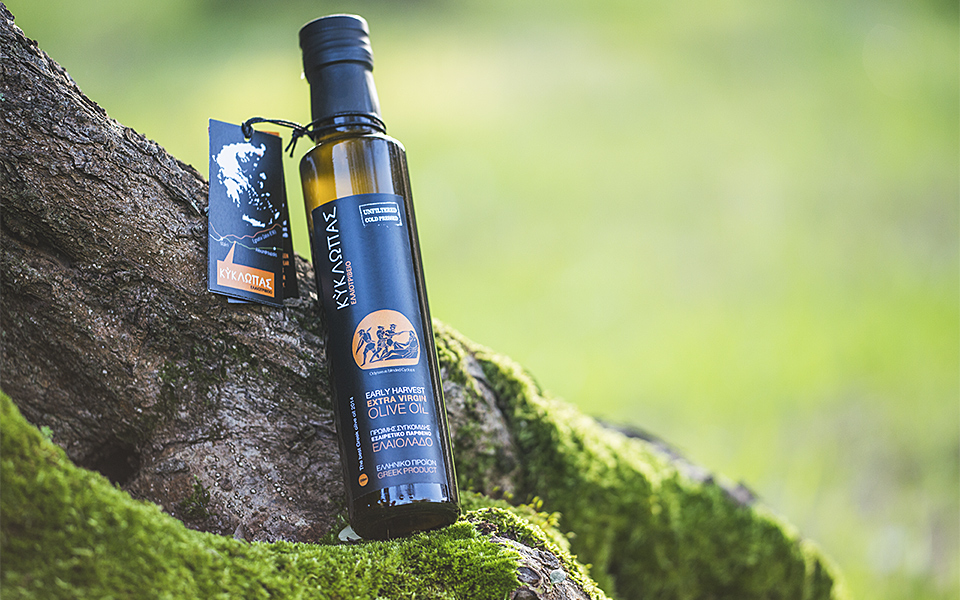
Olive Oil Producer’s Award: Kyklopas
In Thrace, the fruits of one of the oldest olive groves in the Mediterranean are used to produce the olive oil Kyklopas. The olives, of the local Makris variety, produce a light but full-flavored oil with complex aromas.
Argyris and Niki Kelidis took over the family’s estate in 1982, and have been improving the methods used to produce their oil ever since. Their privately-owned, modern olive press allows them to press the olives immediately after they are picked, ensuring a final product of the highest possible quality.
They have distinguished themselves at several international competitions, and 30% of their production is exported. In a blind taste test organized by Gastronomos magazine and the olive oil tasting laboratory of the Technological Education Institute of the Peloponnese, Kyklopas placed first out of 10 formidable Greek olive oils. It was praised for its rich flavor, positive characteristics and lack of any hint of bitterness.
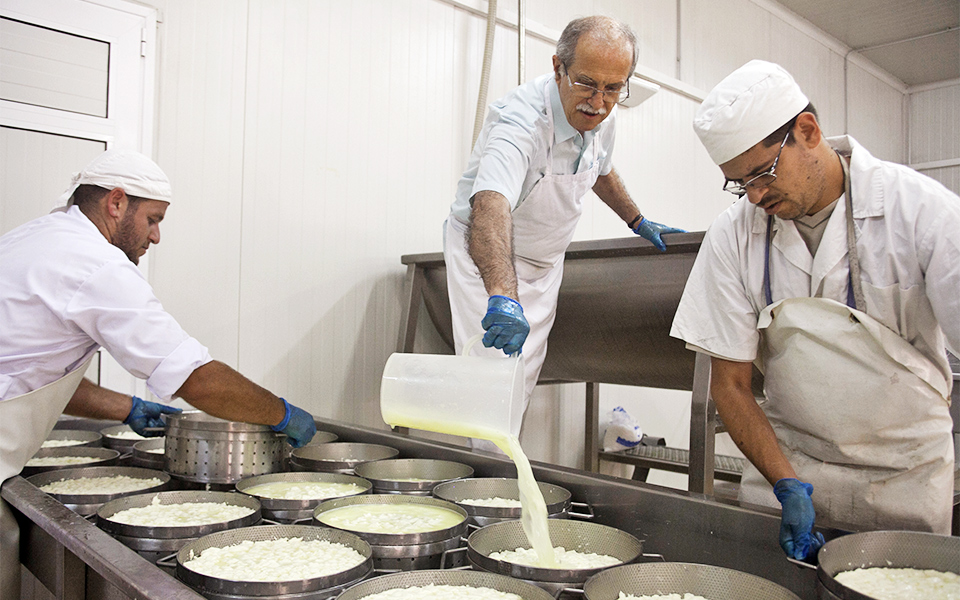
© Aggelos Giotopoulos
Cheesemakers Award: Andros Cheesemakers “Krevasara”
Strictly a family business, the Krevasara creamery is located in Korthi, Andros, where they first opened in 2008. The work is split between Dimitris Asoutis, his wife Violeta, their younger son Periklis, and his elder brother Nikos, who studied at the Dairy School of Ioannina and is the business’ head cheesemaker.
About 500 liters of milk from their own cows and those of four or five other dairy farmers in the island, is turned into cheese each day at Krevasara.
They received the award specifically for their traditional, pear-shaped, fresh “volaki” cheese, which is buttery, with a concentrated milky flavor, and is wonderfully fragrant thanks to the aromatic herbs of Andros’ fertile pastures.
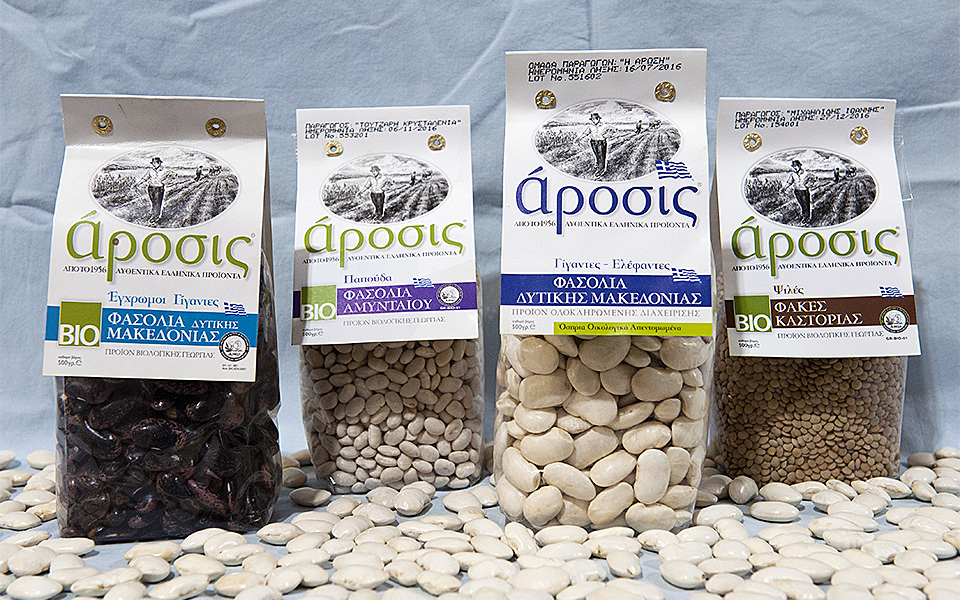
© Alecandros Avramides
Pulse Production Awards: “Arosis”
Arosis works with 127 small producers of pulses from all over Greece. The beans arrive mainly from small producers in the northern regions of Prespes and Kastoria, where the microclimate the of the semi-mountainous area together with the low pH of the soil results in beans that are delicious and which have thin skins rendering them easy to cook and digest. Especially notable are the PDO-labeled, organically farmed broad beans known as elefantes (elephants).
It all started in 1956, when Thomas Stogiannidis, a greengrocer in Kastoria, began purchasing beans from small producers in the nearby villages, and sending them to Athens.
In 1968 his daughter Eleni and her husband, Giannis Fotiadis, were the first to package and and sell pulses from the region of Macedonia.
In 1997, their son Tryfon Fotiadis took over. The raw products are still cultivated using traditional methods, and the company’s quality controls are strict, with the pulses subject to chemical analyses and taste tests.
With 60 years of experience, strong connections with the local community, rising sales year-on-year and 17% of their production destined for export markets, Arosis is a model business contributing to the revitalization of Greek countryside communities.
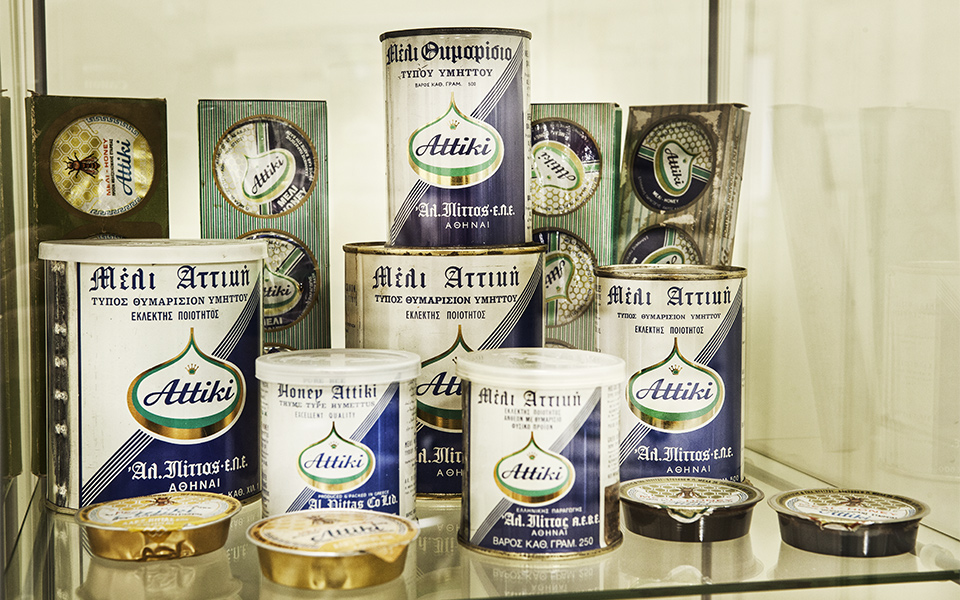
© Sofia Papastrati
Mass-marketed product award: Honey Producer Attiki
Today Attiki Honey collaborates with 2000 Greek beekeepers, bottling 2000 tonnes of honey each year, with 1/8th of the total production exported to 40 different countries.
To look at how this company started, one has to go back 120 years. It all started in 1896, when Georgos Pittas began selling honey from the Ymittos mountain range of Attica, at his store on Stadiou street.
He passed the store to his sons, Alexandros and Panagiotis, who started the company “Ymittos Honey, Attiki” and began bottling honey with a semse of enterprise that was unprecedented for the time. Today, the company is run by Panagiotis’ children: Georgos Pittas, and his sister Alexandra. A fourth generation has also begun working at the company.
Their new facility in Kryoneri near Athens has a modern laboratory to ensure the quality of the honey produced, as well as a ‘Beekeeping Development‘ department. Attiki continues to build on its long history, with an eye to the future.
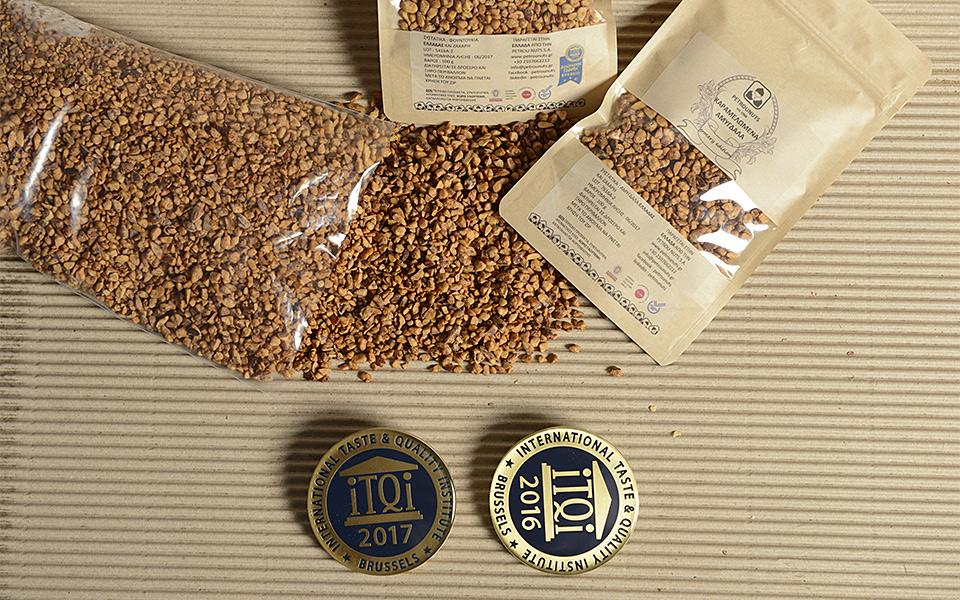
© Aggelos Giotopoulos
The National Bank of Greece Award: Petrou Nuts SA
The Larissa-based company run by the Petrou family has been processing and selling nuts since 1968. Brothers Giannis and Stavros Petrou took over the company in 1986, and have since modernized the facilities, revamped production, and experimented with new products.
Aside from the almonds, hazelnuts, pistachios, walnuts, and more that are sold to other manufacturers, they also have a long-standing relationship with shops in Athens, who sell their fresh and crunchy nuts.
Petrou’s caramelized hazelnuts, which can be found at many delicatessens, have repeatedly won praise at international competitions.
This year, the company will introduce organic hazelnuts, cultivated and harvested by the Petrou family in the northern region of Larissa.

© Akis Orphanidis
Olive Production Award – Georgia Zerva for her meaty Doliana olives
Doliana olives are a local variety of large olives. Crunchy, fleshy, and full-flavored, they are grown by Georgia Zerva and her husband Kostas Bousianas on land that has been in their family for generations. They began curing and packaging them in 2006.
They employ a natural, traditional Greek method: letting the olives pickle for 8 months in barrels of simple salt water (large industries use lye to remove the bitterness of the green olives in just 12 hours).
They are then packaged either plain, in brine or in extra virgin olive oil with herbs. The production is small – no more than 50 tonnes are produced per year and 30-40% of their output is exported.
Their texture and unsullied flavor is what made them stand out from their competitors during Gastronomos’ blind taste test.
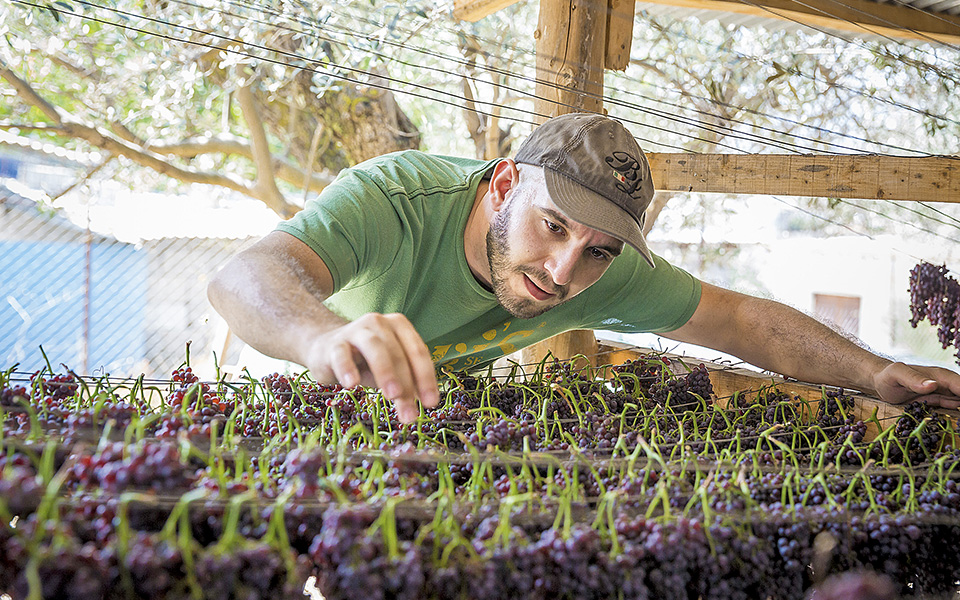
© Dionysis Kouris
Alexandros Giotis Award: organic raisin producer Yiorgos Mazos
Yiorgos Mazos studied business administration at the Technological Education Institute of Athens, but it was his childhood dream to work as a farmer and a producer of the famous Corinthian currants. Hailing from Nemea, the town famous for its vineyards, he grew up listening to the stories his grandfather (winemaker Thanasis Papaioannou), would tell about the glory days of the currant – the onetime lifeblood of the region.
In 2010, he acquired 3 hectares, and began growing organic black Corinthian currants. He dries them naturally in the shade; a technique sometimes used in the older days, but which was abandoned due to the time it takes (it takes four times as long as drying the currants in the sun).
Rather than spreading the currants out on the ground, he hangs them from wires inside sheds, so that air reaches them from all sides, and the fruit remains unbruised. Why go to all this trouble? The result is a plump raisin with all the fruity fragrance and flavor of the fresh fruit, and it’s not at all sticky. A Greek super food at it’s best!
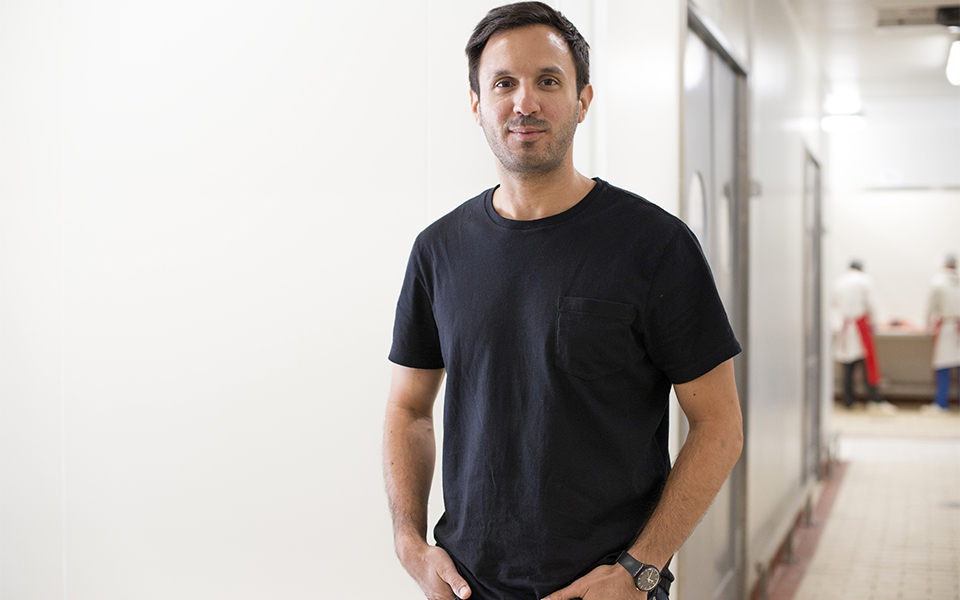
© Aggelos Giotopoulos
Meat Producers Award: Organic farmers “Eviotopi”
In 1981, economist and businessman Minas Chalaris built a domestic animal farm in northern Evia. His goal was to ultimately create a farm-to-shelf meat-producing business, raising animals organically and in natural conditions.
In 2006 a major step to realizing this dream was taken when Chalaris opened a butcher’s shop in the Athenian suburb of Psyhiko. Slowly but surely the business began to thrive, with his son Nikolas taking over in 2015.
Today, Eviotopi is a model organic farm covering 12 hectares on which poultry, pigs, sheep, and cattle are raised in a natural setting and follow natural rhythms. The company has its own processing plant ensuring the complete traceability of its meat products, high-end butcher shops and an e-shop, and also collaborates with other Greek organic farms. Most important of all though, is that they produce meat that is incredibly tasty and has great nutritional value.

© Katerina Kampiti
Best Shop Award: “Asimakopoulos Bros” Pastry shop
In 1915, Georgos Demesas opens a dairy shop in Exarchia. He serves milk, rice pudding, and butter with honey while his nephews also make home deliveries. Four of those nephews, the brothers Iraklis, Dimitris, Vasilis, and Nikos later purchase the shop, and continue their uncle’s work with a focus on sweets and pastries.
In 1980, Dimitris and Thanasis Asimakopoulos take over the shop which they run with their daughters, Jane and Christina, who will eventually take over after them.
Proud of their history, they purchase their milk directly from farmers in nearby Spata and Markopoulo, make their own butter and cream the traditional way, and make exquisite ice cream and pastries. Their big seller is their excellent traditional yogurt.
Asimakopoulos is a landmark pastry shop in Athens that has managed to survive for over 100 years thanks to the quality of their ingredients and their respect for authentic flavors.
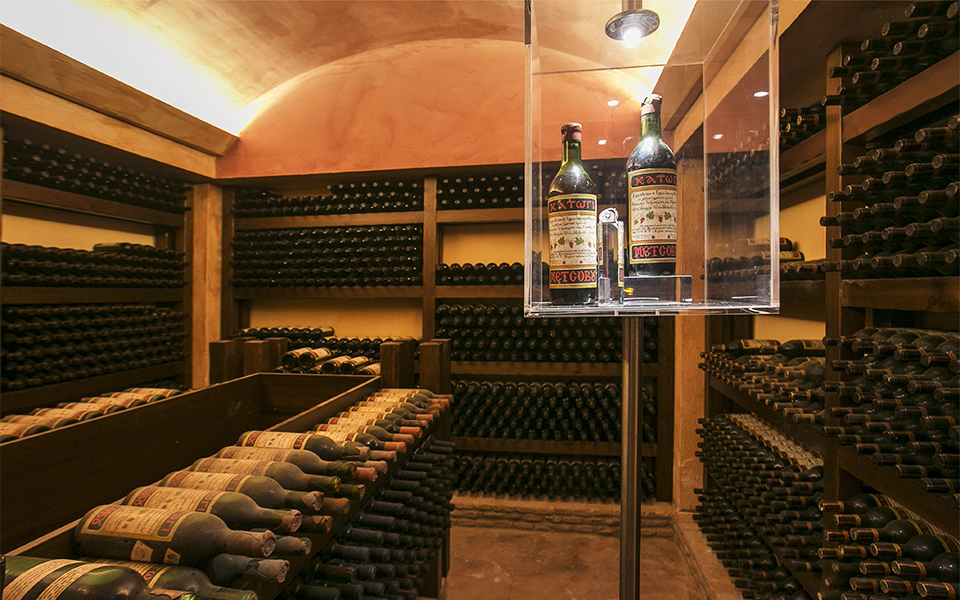
Wine Producers Award: “Katogi Averoff”
In 1959, Evangelos Averoff sought to re-establish vineyards on the abandoned slopes of the Pindos mountain range in Metsovo and rekindle the local winemaking tradition of the 18th and 19th centuries. In 1963, in the traditional katogi (or cellar) of his home he bottled the first premium Greek wine: Katogi Averoff. The label read: “French vines in Greek mountain soil”.
Today Katogi Averoff is an internationally recognized red wine that has been in continual production ever since.
In 2008 the winery underwent a comprehensive overhaul and a state-of-the-art winery was created that is open to the public. It is part winery, part museum offering guests an impressive introduction to the history of the winery and wine-making techniques via audio-visual exhibits. A tasteful hotel is also created.
Today, Katogi Averoff is run by Alexandros Ioannou, Evangelos Averoff’s grandson. The company invests as much time and effort in protecting indigenous grape varieties, as they do in wine tourism. The winery, hotel and Averoff gallery is unique in Greece, possibly internationally, and a role model for all wine producing regions.
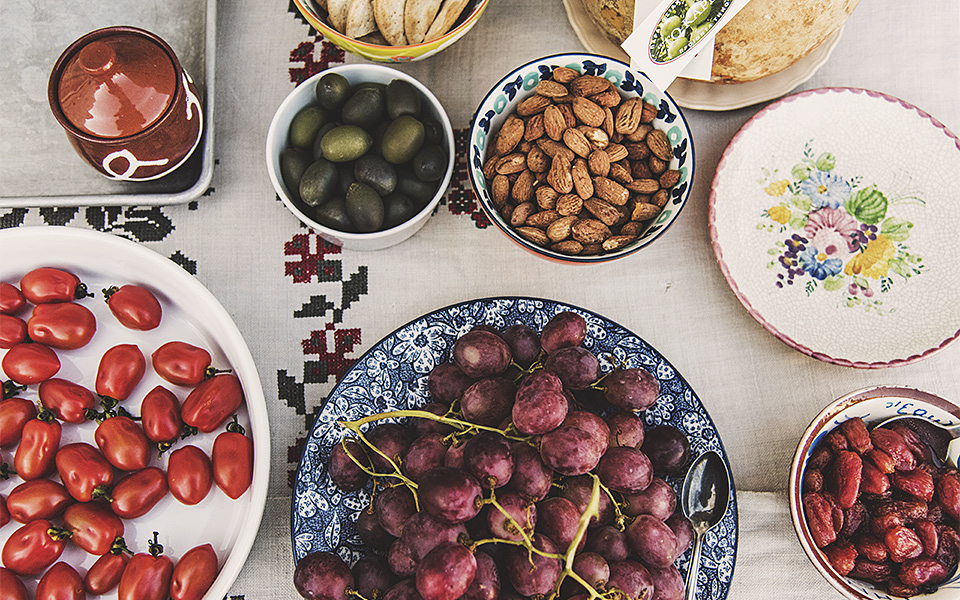
© Evelyn Foskolou
Honorary Award – Tinos Food Paths
For three years, every winter Tinos has been busy. Cooks, restaurateurs, farmers, pastry chefs, home-makers, and volunteers having been gathering, planning, and getting to work.
Come the beginning of summer, they are ready for Tinos Food Paths; a festival of local flavors and a way to honor the Cycladic lifestyle. It’s a moving celebration.
The exciting local cuisine is presented in all its glory during the festival. Guests try famous products of the island, such as the excellent cheeses, charcuteries, wines (which are purchased by top French restaurants), and the new, but already multi-award winning, beer. They are also introduced to local cooking methods and traditions, along with the producers and cooks that are their safe-keepers.
But what is most important is that for the three years the festival has been running, the locals have been coordinating with each other. Producers were mobilized, and dormant fields were sown. Already four restaurants share beef that is raised specifically for them, and many others buy local fruit, vegetables, and dairy products.
This inspiring initiative has – without any outside funding – managed to build a solid foundation for the island as a gastronomic destination and is a model worth replicating.










